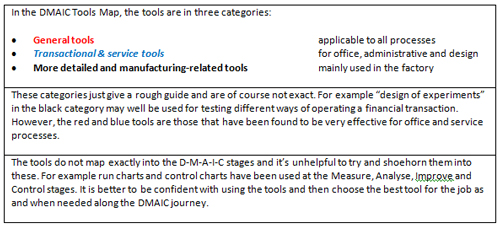Andy Trainer
20 Jan 2012
Lean Six Sigma for the Office and Service Industry
Lean Six Sigma for knowledge workers and service processes
Do you work in a non-manufacturing group? If you are applying lean improvement methods but you don’t make goods then you probably supply a service or do “knowledge processing”. Lean thinking in these areas is often called “transactional lean”, “administrative lean”, and “lean for service”.
Non-manufacturing activities where lean methods have been used successfully include the following. You may well work in one of these areas:
- advertising
- entertainment
- financial services
- healthcare and hospitals
- hospitality and hotels
- insurance
- logistics and distribution
- marketing
- online services
- product design
- project management
- property sales
- travel and tourism
- public sector**
**the public sector (“state sector”) is 40% of the USA economy and about 50% of the UK and the EU economy.
Service industries are the largest part of Western economies
This is a table of percent of gross domestic product (GDP)

(http://earthtrends.wri.org 2005/2006)
This shows that the service industries make the largest contribution to the economies of the North America, Europe and the UK.
How much information is available on lean for service industries?
A Google web search shows the following:

This shows that there is five to ten times more information on lean manufacturing than lean for office and service processes, despite the fact that non-manufacturing is by far the largest part of Western economies. Scanning books on Lean Six Sigma, historically we see many publications and case studies of lean and Six Sigma for manufacturing. Only more recently (from ~2003) do we see some publications on lean for office and service processes, and there are few case studies published.
So, we have a paradox. The largest target for benefits from Lean Six Sigma is office and service industry, whereas most of the tools in Lean Six Sigma have been developed for the manufacturing industry. The Lean Six Sigma tool set is historically biased towards manufacturing. On many lean and Six Sigma training courses, most of the participants are from non-manufacturing areas. We therefore need to ensure that Lean Six Sigma training is well adapted to those working in office and service industries. When this is done, the thinking processes in lean and Six Sigma have been proven to be highly effective for improving non-manufacturing processes. Application of Lean Six Sigma has raised throughput, reduced costs, increased quality and improved engagement of customers and employees.
So how do we adapt Lean Six Sigma for service industry and office processes?
The DMAIC Tools Map shows the DMAIC (Define Measure Analyse Improve Control) steps of the standard DMAIC method for running process improvement projects. The map contains the Lean Six Sigma methods and tools that are used for DMAIC improvement projects.

Short descriptions of the tools can be found in the Silicon Beach Training Six Sigma Glossary
Ten tools for office processes
Very useful tools for office, service and transactional processes (tools that may not all be found in the standard Lean Six Sigma toolkit) include:
- Service demand analysis
- Capacity analysis
- Failure demand analysis
- Activity sampling in the office
- Interruptions log (multitasking analysis)
- Overall professional effectiveness
- Time management
- Knowledge management
- Theory of Constraints for the office
- Critical Chain project management.
These methods are taught in Silicon Beach Lean Six Sigma Green Belt training and Value Stream Mapping training courses.
A combination of these ten tools for transactional processes together with the general tools from Lean Six Sigma (the red tools on the Map) forms a powerful weapon for increasing throughput, attacking office waste, and improving service delivery in all types of organisation.